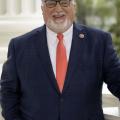40th Assembly District
Not in 40th Assembly District? Find your guide.
RETURN BALLOTS BY TUESDAY, MARCH 3RD
The Courage California Voter Guide compiles the information that allows you to make informed decisions about the races on your ballot, based on your values. Vote in every race on your ballot! It's our right and our responsibility. Please share this guide with your friends and family.
State Assembly, 40th District
Assemblymember James Ramos has lived on the San Manuel Indian Reservation in San Bernardino all his life and was the first Native American to be elected to the Assembly. He is the incumbent, having won the seat in 2018. According to campaign materials, he’s seeking re-election to continue making gains in economic development, homelessness, education, and public safety in the Inland Empire.
In the State Assembly, Ramos’ Early Suicide Prevention Bill (AB 1767) became law in November 2019. The bill expands the school district’s suicide prevention policies to include kindergarten and grade 1- 6. Ramos also authored two bills to address financial inequity: the Fair Access to Credit Bill, which would cap interest rates of payday loans, and the Small Business Tax Relief Bill, which would create a tax benefit for small businesses. James Ramos currently chairs the Select Committee on Native American Affairs.
Prior to his election to the State Assembly, he was the Board Chairman for San Bernardino County Board of Supervisor. He is co-founder of the San Manuel Band’s Cultural Awareness Program, and director of the annual California Indian Cultural Awareness Conference.
Ramos has progressive education and economic stances. That said, he has voted against key progressive bills on criminal justice reform, healthcare, the environment, labor, and housing.
Ramos is being challenged by Jennifer Tullius (R). In 2019 Ramos scored an 18 out of 100 on Courage Score, our annual analysis of a legislator's progressive voting records. According to recent election results, Democrats can win this seat but it's often a close race. Though we disagree with Ramos stances on the issues named above, and know that a stronger progressive candidate would more accurately represent the 40th district, Ramos is the most progressive candidate on the ballot. That said, we encourage more progressive candidates, that will better reflect this community’s needs, to run in future cycles.
Assemblymember James Ramos has lived on the San Manuel Indian Reservation in San Bernardino all his life and was the first Native American to be elected to the Assembly. He is the incumbent, having won the seat in 2018. According to campaign materials, he’s seeking re-election to continue making gains in economic development, homelessness, education, and public safety in the Inland Empire.
In the State Assembly, Ramos’ Early Suicide Prevention Bill (AB 1767) became law in November 2019. The bill expands the school district’s suicide prevention policies to include kindergarten and grade 1- 6. Ramos also authored two bills to address financial inequity: the Fair Access to Credit Bill, which would cap interest rates of payday loans, and the Small Business Tax Relief Bill, which would create a tax benefit for small businesses. James Ramos currently chairs the Select Committee on Native American Affairs.
Prior to his election to the State Assembly, he was the Board Chairman for San Bernardino County Board of Supervisor. He is co-founder of the San Manuel Band’s Cultural Awareness Program, and director of the annual California Indian Cultural Awareness Conference.
Ramos has progressive education and economic stances. That said, he has voted against key progressive bills on criminal justice reform, healthcare, the environment, labor, and housing.
Ramos is being challenged by Jennifer Tullius (R). In 2019 Ramos scored an 18 out of 100 on Courage Score, our annual analysis of a legislator's progressive voting records. According to recent election results, Democrats can win this seat but it's often a close race. Though we disagree with Ramos stances on the issues named above, and know that a stronger progressive candidate would more accurately represent the 40th district, Ramos is the most progressive candidate on the ballot. That said, we encourage more progressive candidates, that will better reflect this community’s needs, to run in future cycles.
State Senate
State Senator, 23rd District
Abigail Medina currently resides in San Bernardino County. According to campaign materials, she is running for State Senate to improve educational opportunities for her district and to be a voice for historically marginalized communities.
Medina serves as the Board President of the San Bernardino City Unified School District (SBCUSD) and Executive Director of Inland Region Equality Network (IREN), where she works to improve youth educational opportunities and elevate disadvantaged communities. While sitting on the school board, Medina has helped improve SBCUSD’s graduation rate from 70 percent, in 2013, to 90 percent, in 2018, and as ED of IREN, Medina has advanced initiatives in the Inland region to empower the LGBTQ+ community. Medina has also worked for the California Association for the Gifted, Congregation Organized for Prophetic Engagement (COPE), Health Advocates, and the District African American Council.
Medina is running against Kris Goodfellow (D), Rosilicie Ochoa Bogh (R), Cristina Puraci (R), and Lloyd White (R) for this open seat. According to recent election results, it's rare that Democrats win this seat. Medina stands out as the progressive choice because of her proven track record of being a community advocate and her ability to solve the issues faced by her community.
According to our analysis, Medina is the strongest choice for progressive leadership in office.
Abigail Medina currently resides in San Bernardino County. According to campaign materials, she is running for State Senate to improve educational opportunities for her district and to be a voice for historically marginalized communities.
Medina serves as the Board President of the San Bernardino City Unified School District (SBCUSD) and Executive Director of Inland Region Equality Network (IREN), where she works to improve youth educational opportunities and elevate disadvantaged communities. While sitting on the school board, Medina has helped improve SBCUSD’s graduation rate from 70 percent, in 2013, to 90 percent, in 2018, and as ED of IREN, Medina has advanced initiatives in the Inland region to empower the LGBTQ+ community. Medina has also worked for the California Association for the Gifted, Congregation Organized for Prophetic Engagement (COPE), Health Advocates, and the District African American Council.
Medina is running against Kris Goodfellow (D), Rosilicie Ochoa Bogh (R), Cristina Puraci (R), and Lloyd White (R) for this open seat. According to recent election results, it's rare that Democrats win this seat. Medina stands out as the progressive choice because of her proven track record of being a community advocate and her ability to solve the issues faced by her community.
According to our analysis, Medina is the strongest choice for progressive leadership in office.
State Senator, 25th District
State Senator Anthony Portantino is from Long Branch, NJ. He is the incumbent, having served in this position since 2016. According to campaign materials, he is running for reelection to continue to represent the needs of the foothills community in the State Legislature.
As a State Senator, Portantino has advanced bills to address public health issues, increase access to higher education, and improve senior citizens’ services. Prior to his election to the State Senate, Portantino served on the La Cañada Flintridge City Council, as Mayor of the Santa Monica Mountains Conservancy Advisory Committee, and as President of the League of California Cities Mayors and Councilmembers Department.
As Senate Appropriations Chair, Portantino took actions that resulted in various progressive bills being tabled. Even though we don’t agree with all of Portantino's actions as Appropriations Chair, his position of power in the State Senate, his support of inclusive education and health policies make him a strong choice in this race.
Portantino is running uncontested for reelection. Based on our Courage Score analysis, Portantino has often shown courage advocating for the needs of constituents and facing down corporate lobbyists and interest groups that exploit Californians.
State Senator Anthony Portantino is from Long Branch, NJ. He is the incumbent, having served in this position since 2016. According to campaign materials, he is running for reelection to continue to represent the needs of the foothills community in the State Legislature.
As a State Senator, Portantino has advanced bills to address public health issues, increase access to higher education, and improve senior citizens’ services. Prior to his election to the State Senate, Portantino served on the La Cañada Flintridge City Council, as Mayor of the Santa Monica Mountains Conservancy Advisory Committee, and as President of the League of California Cities Mayors and Councilmembers Department.
As Senate Appropriations Chair, Portantino took actions that resulted in various progressive bills being tabled. Even though we don’t agree with all of Portantino's actions as Appropriations Chair, his position of power in the State Senate, his support of inclusive education and health policies make him a strong choice in this race.
Portantino is running uncontested for reelection. Based on our Courage Score analysis, Portantino has often shown courage advocating for the needs of constituents and facing down corporate lobbyists and interest groups that exploit Californians.
Statewide Ballot Measures
This proposition would provide $9 billion for desperately needed renovations to public preschools and grade schools throughout the state, and $6 billion for construction to community colleges, the Cal State system, and the UC system. This will allow the state of California to use tax revenue to pay for improvements that local communities cannot afford.
The funding would come from bonds the state would pay back over 35 years, totaling an estimated $26 billion, which includes $15 billion in principal and $11 billion in interest. This investment is well worth the costs. It takes money, after all, to ensure that students -- especially those in districts that can’t afford major capital improvement projects -- do not have to learn in dangerous environments.
The vast majority of Democrats in the state legislature support it, as does Gov. Newsom, and the only major opposition is a group called the Howard Jarvis Taxpayers Association. This is the group famous for destroying California’s school funding system in 1978 through another proposition, ironically one that was also dubbed Prop 13. The group spends most of its time lobbying to reduce tax rates. It has never shown any interest in supporting California’s children, at least if that means wealthy individuals or giant corporations would pay their fair share in taxes.
Critics of the measure have pointed out that the ballot measure’s language includes a provision that frees new multi-family developments around subway stops and bus stations from school impact fees. This provision will make it easier for developers to build apartment buildings within a half-mile of public transit but could also drive up the cost of new housing and take funds away from school districts across the state. Despite this provision, the measure is still supported by most education groups in the state, who believe the overall funding allocation to schools outweighs the impact of reduced funding to school districts located near transit hubs. 2020’s Prop 13 is worth the investment since it means children will soon be able to attend school in buildings that are retrofitted to withstand earthquakes and no longer have lead in their water.
We strongly recommend a YES vote on Prop 13.
This proposition would provide $9 billion for desperately needed renovations to public preschools and grade schools throughout the state, and $6 billion for construction to community colleges, the Cal State system, and the UC system. This will allow the state of California to use tax revenue to pay for improvements that local communities cannot afford.
The funding would come from bonds the state would pay back over 35 years, totaling an estimated $26 billion, which includes $15 billion in principal and $11 billion in interest. This investment is well worth the costs. It takes money, after all, to ensure that students -- especially those in districts that can’t afford major capital improvement projects -- do not have to learn in dangerous environments.
The vast majority of Democrats in the state legislature support it, as does Gov. Newsom, and the only major opposition is a group called the Howard Jarvis Taxpayers Association. This is the group famous for destroying California’s school funding system in 1978 through another proposition, ironically one that was also dubbed Prop 13. The group spends most of its time lobbying to reduce tax rates. It has never shown any interest in supporting California’s children, at least if that means wealthy individuals or giant corporations would pay their fair share in taxes.
Critics of the measure have pointed out that the ballot measure’s language includes a provision that frees new multi-family developments around subway stops and bus stations from school impact fees. This provision will make it easier for developers to build apartment buildings within a half-mile of public transit but could also drive up the cost of new housing and take funds away from school districts across the state. Despite this provision, the measure is still supported by most education groups in the state, who believe the overall funding allocation to schools outweighs the impact of reduced funding to school districts located near transit hubs. 2020’s Prop 13 is worth the investment since it means children will soon be able to attend school in buildings that are retrofitted to withstand earthquakes and no longer have lead in their water.
We strongly recommend a YES vote on Prop 13.


